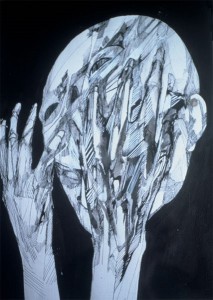Yesterday evening I delivered the Newman Lecture at the Institute for the Psychological Sciences in Arlington, VA. The following is an excerpt adapted from those remarks.
Have you ever tried to pray for an hour or more, or even gone for a weekend of silence and prayer on a retreat, and found your mind buzzing with distractions, and your heart barren and dry? Do you then have the disquieting sense that no one is there – neither to listen nor to hear?
This experience marks a crucial step in one’s own maturity. It shows – inflicting pain – that God is not within the range of any of our senses. As St. John the Evangelist tells us more than once: “No one sees God.” We cannot see Him, or hear Him, either. Nor touch Him, nor catch scent of Him, nor taste Him. He is too vast.
Human experience teaches us – taught Plato, taught Aristotle – that although the pursuit of truth drives us, and the pursuit of the source of all good powerfully attracts us, and although the Divine insistently beckons to us, our natural equipment cannot take us to what we long for. Our aspirations go higher than our natural equipment will bear.
This is partly what we mean when we say that our human nature, left to itself, has limits it cannot go beyond. And yet it has longings that point beyond itself. For example, our endless drive to ask questions, our unrestricted desire to understand and to know, which is our first intimation of the infinity of the Source of all knowing. Beyond every answer to the question why? rushes in another why?
The streaks of dryness in our prayers, the emptiness we often find within (especially as we grow older), are caused by the poverty of our natural equipment, on the one hand. Then, secondly, they are caused by the disproportion of the infinite intelligence, will, and love of God to ours, even when we are gifted by His grace. We are given sight, and yet we see through a glass darkly – not directly, not fully, but just enough to sharpen our longing for the full vision.

We work in darkness, and often the more so, the further in faith we advance. In the desert, the dark valleys, the impenetrable swamps, it is best for us to seek out guides.
That is why when we seek to be in the presence of God, to converse with Him, to pray, to allow our minds and hearts to rest in Him, we find ourselves internally so empty. That is why St. John of the Cross (1524-1591), that splendid priest, scholar, poet, confessor, and spiritual mentor to thousands of souls, in The Ascent of Mount Carmel wrote so much about “The Dark Night of the Senses and Imagination and Memory.” And then on a still deeper level, The Dark Night of the Soul.
The world of the Spirit does break in on us, though. We catch sight of a glorious dawn, or a silent sunset radiant with peace and tranquility. “Our hearts are lifted,” we say. We seem to catch sight of an infinite light trying to break through, as if it were a Beauty more beautiful than the dawn and the sunset that we do see. We feel that Beauty is teasing us on, giving us hints, drawing us to itself. And when we sit in peace in its presence, yes, we sometimes feel overwhelmed with sweetness – and sometimes we are also almost painfully drawn toward Somewhere we cannot quite go. Yet at other times we sit in silence, feeling nothing but aridity, nothing but a taunting darkness. We crawl in a barren desert, windswept, empty. We are drawn powerfully to Something or Someone, and yet when we climb the stairs to the top – No one is there (to use an image of St. John’s).
How can these two things happen? The sweetness, the attraction sometimes – but also the emptiness, the absence, the desert?
St. John learned from this experience in his own life. When he was a beginner in acquiring knowledge of God, God seemed to treat him as one treats a child – encourages the young striver with sweets, attention, affection. But when it is time for the child to become an adult, the mother begins to withdraw. As our faith becomes more mature, we need to learn that our God is not fully found in the sweet world of the senses. Rather, He dwells beyond sense experience.
Human experience itself suffices to teach us about this nothingness experienced by the voyager in pursuit of God. The literature of virtually every part of the world tells of the nothingness, the emptiness, the aridity. And the necessity of voyaging through it.
In addition, the New Testament teaches us that the Savior surprisingly, startlingly, comes not as the Powerful One but as the weak, abject, rejected, outcast one. Take up your cross. Go out into the desert. Pray. Fast! . . . Christian faith throws a deeper, more challenging light upon the darkness and aridity on this side of the human experience. It teaches us that in a certain emptiness is where alone the True God can be found. That is where our Savior bids us follow.











